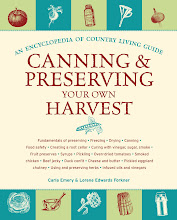Food coloring has always been a bit of a mystery to me.
What ingredients really go into making food coloring? Surely Yellow No. 5
cannot be found growing in nature. To avoid the unknowns of store bought food
coloring, The Encyclopedia of Country Living lists herbs and food products you
can use to make your own colorings.
Black: barberry leaves
Blue: blueberries
Brown: nut hulls (walnuts are best), tea, coffee, rose
hips, tobacco, hickory chips
Green: beet tops, sunflower seeds, birch leaves, Spanish
onion skins (outer leaves only), elderberry leaves, spinach, cabbage, rhubarb
leaves
Orange: orange juice
Pink: cherries, beat and sassafras roots
Purple: blackberries, cherries, huckleberries,
cranberries, raspberries, grapes, purple cabbage
Red: red onion skins, bloodroot, fresh beet juice, madder
root, and logwood
Yellow: the stem, leaves, and flowers of apple bark,
barberry stems and roots, cinnamon, curry, ginger, the stems, leaves, and
flowers of goldenrod, hickory bark, mustard, paprika, pear leaves, saffron,
tangle wood stems, turmeric
If you lack the time, ingredients, or patience to create
your own homemade food coloring and have a small selection of store bought food
colorings at home, use this chart to create new colors with what you have on
hand.
COLOR BLENDING CHART:
2 drops yellow, 1 drop green, and 1 drop red= blue
1 drop red, 2 drops green, and 1 drop blue= gray
2 drops blue, 1 drop green= dark green
3 drops yellow, 1 drop blue= light green
12 drops yellow, 1 drop green= olive
2 drops red, 1 drop blue= orchid
3 drops red, 1 drop yellow= orange
3 drops red, 4 drops yellow, and 1 drop green= tangerine








1 comment:
Great list! Traditional store bought food colorings are made from petroleum and added preservatives. Our family reacts to them in many ways, and they can cause learning, behavioral, and health problems for many people. I write about our struggles at www.DieFoodDye.com, collect guest blogger stories from other parents of dye-allergic kids, and interview the kids themselves. You can also buy ready made liquid all natural food coloring online or in health food stores, made by Chocolate Craft, India Tree, Seelect, Maggie's Naturals, and some ChefMaster (some ChefMaster and India Tree products include petrol dyes, but they have separate dye-free lines). I will be sure to share this post with my readers on my DFD Facebook page! :)
Post a Comment